
CHICAGO — A first-in-the-nation web-based app to facilitate communications and improve relations between tenants and landlords, “Squared Away Chicago”, was launched today by the Metropolitan Tenants Organization (MTO) at a reception for housing and technology leaders hosted by The Chicago Community Trust.
Click HERE to use our web app now!
Squared Away Chicago is a free web-based app that any landlord or tenant can access through a URL link, squaredawaychicago.com. It is designed to be used on any mobile phone browser and to take advantage of a mobile phone’s tools and convenience.
“Every day, tenants turn to MTO for support in resolving their housing problems and the Squared Away Chicago app not only will increase our capacity to serve, but by applying modern communication tools it promises to revolutionize the way landlords and tenants do business,” said John Bartlett, executive director, Metropolitan Tenants Organization. “Whether you are a student renting for the first time or life-long renter, the app will provide tools tenants and landlords need to succeed and avoid common pitfalls which lead to dissatisfaction and possible evictions.”
The app provides access – at the touch of a finger – to resources, knowledge about rights and the ability to document and share issues between tenants and landlords in real-time, leading to faster issue resolution, increased accountability and fewer misunderstandings.
“Giving renters a way to take pictures and send and store communications gives us a leg up in documenting and resolving issues before they turn into bigger problems,” said Ashley Dearborn, a local Chicago tenant. “The app also helps renters like me understand the laws that our landlords must follow so we can know what our rights are.”
Likewise, landlords have their own set of challenges in providing information and updates to tenants and maintaining constructive communications. “The Squared Away Chicago app is a great tool for tenants, owners and management companies and hopefully it can help to improve the communication between all the parties,” saidEiran Feldman, principal with First InSite Realty, an owner and management company in Chicago. The goal of the app is to promote good rental practices that lead to more stable tenancies and reduce turnover.
APP FEATURES FACILITATE COMMUNICATION & BUILD RELATIONS
The Squared Away Chicago app is designed to support both tenants and landlords by enabling them to improve the landlord-tenant relationship through increased communication and accountability. The creation of the app was supported by the John D. & Catherine T. MacArthur Foundation, The Chicago Community Trust, and theMarguerite Casey Foundation.
“The Squared Away Chicago app has the potential for nationwide adoption, serving as a significant resource to build a community of informed and engaged tenants and landlords,” said Julia M. Stasch, Vice President of U.S. Programs at the MacArthur Foundation. “The best practices and documentation capacity of the Squared Away app are universal features that can serve as a platform to help build a more efficient and better functioning rental housing market for all households.”
With the Squared Away Chicago mobile app, tenants and landlords will have these four features at their fingertips:
- Residential Landlord Tenant Ordinance (RLTO): Accessing the law provides users with knowledge about the rights of tenants and landlords.
- Photo Sharing: Tenants can take/upload photos of issues, creating a visual record that is instantly accessible to the landlord.
- Letter Templates: Specific details of housing-related issues can be inserted in template documents and then accurately and quickly shared with landlords.
- Report a Problem: Provides the ability to track communications about issues and organize and save the string of communications for reference and documentation.
“As a resource for members of the Marguerite Casey Foundation’s family-led Equal Voice Campaign, the Squared Away app will serve to strengthen the voice of low-income families, supporting informed and engaged tenants and landlords that will ultimately serve to build awareness of renters’ housing rights and options,” said Edgar Villanueva, program officer, Marguerite Casey Foundation.
APP DESIGN ADDRESSES NEEDS OF TENANTS & LANDLORDS
Through MTO’s 28 years of experience serving renters in Chicago, the organization has found that poor communication and a lack of awareness of rental laws often leads to unresolved housing issues, dissatisfaction, unnecessary evictions and/or loss of rental income, as well as costs associated with turnover and a devaluing of property.
When Greater Good Studio, a Chicago-based firm using design methods to solve social problems, was enlisted to identify a set of app features that would best support tenants and landlords through the rental life cycle, they looked at what makes a successful tenancy. Their review found that a successful tenant-landlord relationship occurred when there was a communicative relationship, problems and issues were resolved, and the tenant and landlord maintained long-term mindsets.
To promote successful tenancies, Greater Good Studio identified that the app needed to address the following issues:
- Assist tenants in following best practices and acting according to their rights.
- Encourage both parties to keep a lasting, shared record of housing-related issues.
- Support landlords and tenants in building relationships and maintaining clear, responsive communication.
- Identify opportunities for working together across the rental journey, from move-in to repairs to seasonal issues to deposit return.
“Our human-centered design research informed the development of the most critical features, a process for registering issues and a shared timeline for both parties to view progress toward issue resolution. These features solve the often emotional process of tenant-landlord communications, while being delivered through a simple, intuitive user interface,” said Sara Cantor Aye, founder, Greater Good Studio.
The development of the app was completed by Chicago firms Philamonjaro Studios and DevMynd, taking into account the need for a user-friendly design and functionality that was both easy and quick to navigate and facilitated communications about housing-related issues.
“The Squared Away app uses responsive Web design which means there is no downloading or updating required, making it easy for tenants and landlords to access and start the process in the moment of need,” said Dan O’Neil, executive director, Smart Chicago Collaborative. “This user-friendly app is focused on issue resolution and asks for the minimum amount of information necessary to kick off communications, offering a great resource for people to get squared with their abode in Chicago.”
APP OFFERS BROADER ACCESS TO RESOURCES FOR TENANTS & LANDLORDS
According to a May 2010 survey by the Pew Research Center’s Internet & American Life Project, cell phone and wireless laptop internet use have each grown more prevalent, with six in ten American adults going online wirelessly using either a mobile phone or a laptop with a wireless internet connection. Further, 40% of adults use the internet, email or instant messaging on a mobile phone.
“Internet and social media usage has grown exponentially as mobile devices have become more accessible. The Squared Away Chicago app is a cutting-edge example of capitalizing on this channel to build a more effective relationship between landlords and low-income tenants through the virtual world,” said Juanita Irizarry, senior program officer, Human Services & Community Development, The Chicago Community Trust.
While thousands of renters currently use MTO’s website, proving the need for web-based rental housing information, the Pew study demonstrates the additional need for an app or internet access compatible with mobile devices.
“The Squared Away Chicagoapp is a true innovation and national example that will benefit renters and landlords throughout the region and improve the quality and livability of housing in the Chicago area,” said Lawrence Grisham, managing deputy commissioner of the Chicago Department of Housing and Economic Development.
Click HERE to watch a video about Squared Away Chicago and make sure to visit www.squaredawaychicago.com!









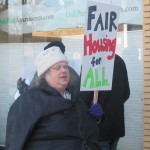

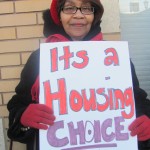






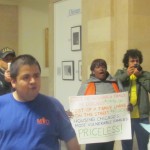

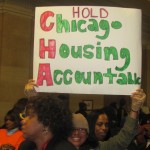

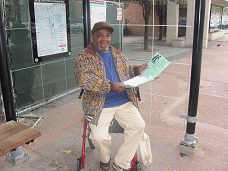

 In January of 2011, tenants from a senior building at 353 E. 53rd Street called MTO complaining of repair problems in their building. The hotline counselor suggested
In January of 2011, tenants from a senior building at 353 E. 53rd Street called MTO complaining of repair problems in their building. The hotline counselor suggested